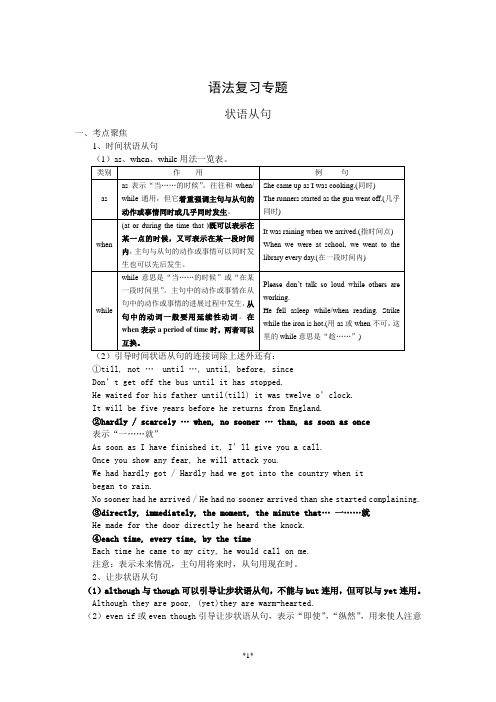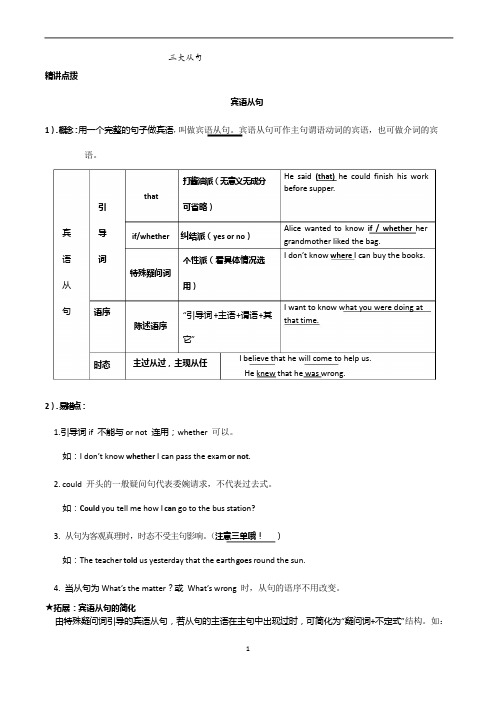三大从句考点讲解及练习
- 格式:doc
- 大小:178.50 KB
- 文档页数:15

中考英语三大从句练习及答案解析定语从句:(一)基础:引导词---who, which, that, whom,练习1.I like cities___________are quiet and clean. 2.I prefer students _________are hard- working.3.I hate TV shows _________ are noisy and boring.4.The music __________ is gentle and quiet attracts me a lot.5.The food __________tastes delicious is not always healthy.6.Those boys ___________ are playing basketballs over there are from Class Fifteen.7.The books ____________ are written by Lu Xun are worth reading.8.The town ___we visited last week is much larger than before.9.The book ___ he bought isvery interesting.(二)特例:只用that的情况1先行词被___________或___________所修饰,或本身是______________________时,只能用 that,2.被修饰的先行词为 ________________________________________________等不定代词时, 只能用 that.3.先行词被 _____________________________________________等词修饰时,只能用 that,而不用which。

语法复习专题状语从句一、考点聚焦1、时间状语从句①till, not … until …, until, before, sinceDon’t get off the bus until it ha s stopped.He waited for his father until(till) it was twelve o’clock.It will be five years before he returns from England.②hardly / scarcely … when, no sooner … than, as soon as once表示“一……就”As soon as I have finished it, I’ll give y ou a call.Once you show any fear, he will attack you.We had hardly got / Hardly had we got into the country when itbegan to rain.No sooner had he arrived / He had no sooner arrived than she started complaining.③directly, immediately, the moment, the minute that… 一……就He made for the door directly he heard the knock.④each time, every time, by the timeEach time he came to my city, he would call on me.注意:表示未来情况,主句用将来时,从句用现在时。
2、让步状语从句(1)although与though可以引导让步状语从句,不能与but连用,但可以与yet连用。

初中英语语法——三大从句汇总在英语中,主要有三大从句,即名词性从句(包括主语从句,宾语从句,表语从句,同位语从句)、形容词性从句(即定语从句)、副词性从句(即状语从句,包括时间、条件、结果、目的、原因、让步、地点、方式等)。
以下是一些基本的从句的语法知识点A、定语从句专项讲解与训练一、定语从句概念定语从句(attributive clause),顾名思义,就是一个句子作定语从属于主句。
定语一般是由形容词充当,所以定语从句又称作形容词从句。
另外,定语从句是由关系代词或关系副词引导的,故又称作关系从句。
定语从句一般放在它所修饰的名词或代词之后,这种名词或代词被称作先行词。
请看示例:The woman who lives next door is a teacher.先行词定语从句在所有的从句中,算定语从句最难掌握,因为汉语里没有定语从句,汉语里只有定语,而且总是放在名词之前来修饰名词。
二、关系代词引导的定语从句关系代词代替前面的先行词,并且在定语从句中充当句子成分,可以作主语、宾语、定语等。
常见的关系代词有:who, that, which。
它们的主格、宾格和所有格如下表所示:先行词主格宾格所有格人 who whom whose物 which which whose of which人、物 that that —(一)关系代词who, whom和 whose的用法who代替人,是主格,在定语从句中作主语。
例如:An architect is a person who designs buildings. 建筑师是设计房屋的人。
I will never forget the teacher who taught us chemistry in the firstyear of my senior middle school.我将永远不会忘记在高一时教我们化学的那位老师。
Anyone who wants to apply for this job must send us the resume by email first. 想应聘这个职位的任何人都必须先通过电子邮件向我们发送简历。

高考英语三大从句讲解+练习(附答案)【名词性从句】名词性从句相当于名词,可分别作主句的主语、表语、宾语和同位语。
因此,名词性从句成分为主语从句、表语从句、宾语从句和同位从句。
(一)引导名词性从句的连接词1、连接代词:who, whose, whom, what, which。
有词义,在从句中担任成分,如主语、表语、宾语、或定语等。
2、连接副词:when, where, why, how。
有词义,在从句中担任成分,作状语。
3、连接词:that, whether, if, as if。
that 无词义,在从句中不担任成分,有时可省略;if (whether), as if虽有词义,但在从句中不担任成分。
1. 主语从句作句子主语的从句叫主语从句。
主语从句通常由从属连词that,whether,if和连接代词what,who,which,whatever,whoever以及连接副词how,when,where,why等词引导。
that在句中无词义,只起连接作用;连接代词和连接副词在句中既保留自己的疑问含义、又起连接作用,在从句中充当从句的成分。
例如:What he wants to tell us is not clear. 他要跟我们说什么,还不清楚。
It is known to us how he became a writer. 我们都知道他是如何成为一名作家的。
Where the English evening will be held has not yet been announced.英语晚会将在哪里举行,还没有宣布。
有时为避免句子头重脚轻,常用形式主语it代替主语从句作形式主语放于句首,而把主语从句置于句末。
主语从句后的谓语动词一般用单数形式。
常用句型如下:(1)It + be + 名词+ that从句(2)It + be + 形容词+ that从句(3)It + be + 动词的过去分词+ that从句(4)It + 不及物动词+ that 从句另注意在主语从句中用来表示惊奇、不相信、惋惜、理应如此等语气时,谓语动词要用虚拟语气“(should) +do”,常用的句型有:It is necessary (important, natural, strange, etc.) that …It is a pity (a shame, no wonder, etc.) that…It is suggested (requested, proposed, desired, etc.) that…注意:连词that, whether在从句中不担任句子成分,只起连接作用,不能省略。

)三大从句精讲点拨宾语从句1).概念:用一个完整的句子做宾语,叫做宾语从句。
宾语从句可作主句谓语动词的宾语,也可做介词的宾语。
宾语引导词打酱油派(无意义无成分that可省略)if/whether 纠结派(yes or no )个性派(看具体情况选He said (that) he could finish his work before supper.Alice wanted to know if / whether her grandmother liked the bag.I don’t know where I can buy the books.特殊疑问词从句语序陈述语序用)“引导词 +主语 +谓语 +其I want to know what you were doing at that time.时态它”主过从过,主现从任 I believe that he will come to help us.He knew that he was wrong.2).易错点:1.引导词 if 不能与 or not 连用;whether 可以。
如:I don’t know whether I can pass the exam or not .2. could 开头的一般疑问句代表委婉请求,不代表过去式。
如:Could you tell me how I can go to the bus station?3. 从句为客观真理时,时态不受主句影响。
(注意三单哦!如:The teacher told us yesterday that the earth g oes round the sun.4. 当从句为 What’s the matter ?或 What’s wrong 时,从句的语序不用改变。
★拓展:宾语从句的简化由特殊疑问词引导的宾语从句,若从句的主语在主句中出现过时,可简化为“疑问词+不定式”结构。

三大从句知识点三大从句是英语语法中的重要知识点,包括名词性从句、形容词性从句和副词性从句。
下面将分别介绍这三种从句的定义、用法和例句。
一、名词性从句名词性从句是在句子中充当名词的成分,可以作主语、宾语、表语或同位语。
名词性从句分为主语从句、宾语从句、表语从句和同位语从句。
1. 主语从句:在句子中充当主语的从句,常用连接词有that、whether、if等。
例句:That she is not coming is a great disappointment to us.(她不来对我们来说是个很大的失望。
)2. 宾语从句:在句子中充当宾语的从句,常用连接词有that、whether、if等。
例句:I don't know whether he will come or not.(我不知道他是否会来。
)3. 表语从句:在句子中充当表语的从句,常用连接词有that、whether、if等。
例句:The important thing is that we finish the project on time.(重要的是我们要按时完成这个项目。
)4. 同位语从句:用来解释或说明名词或代词的从句,常用连接词有that、whether、if等。
例句:The fact that he lied surprised everyone.(他撒谎的事实让每个人都感到惊讶。
)二、形容词性从句形容词性从句是用来修饰名词或代词的从句,常用连接词有who、whom、whose、which、that等。
5. 限制性形容词性从句:对名词或代词进行限制或修饰,不能省略。
例句:The book that I borrowed from the library is very interesting.(我从图书馆借来的那本书非常有趣。
)6. 非限制性形容词性从句:对名词或代词进行补充说明,用逗号与主句隔开,可以省略。
例句:My sister, who is a doctor, lives in London.(我的妹妹是个医生,住在伦敦。
各类从句详解英语从句可以分为名词性从句、定语从句和状语从句三大类:下面我们逐一进行说明:一、名词性从句(主语从句、表语从句、宾语从句、同位语从句)主语从句、表语从句、宾语从句和同位语从句在复合句中的充当的成分和其名称相同,分别作主句的主语、表语、宾语和同位语。
上述这四种从句均被称为名词性从句。
所有的名词性从句均不能用逗号分开,并且它们都用相同的关联词,关联词如下:①主从连词:that (无意义), whether (是否), if (是否)(在句子中不充当任何成分)②连接代词:who (谁), whom (谁), whose (谁的), what (什么), which (哪一个)③连接副词:when (什么时候), where (什么地方), how (怎样), why (为什么)主从连词只起连接作用,连接代词和连接副词除了起连接作用外,还充当从句某一个成分。
另外,可以用whatever, whichever, whoever, who(m)ever等连接代词引导名词性从句,来加强语气。
下面分别对各种名词性从句进行介绍(一)主语从句(subject clause)在主句中用作主语的主谓结构称之为主语从句。
例如:That he will come to the discussion is certain.他来参加讨论是确定的。
That the moon moves round the earth is well known to all of us.月球绕地球转动,这是我们大家都熟知的。
When the meeting is to be held has not yet been decide.会议什么时候召开还没有决定。
主语从句放在句首,句子常常显得比较笨重,因此通常可以把it放在句首,作形式主语,而将主语从句放在后面。
例如上面的句子可以分别改写为:It is certain that he will come to the discussion.It is well known to all of us that the moon moves round the earth.It has not yet been decide when the meeting is to be held.下面再举一些例句:What they are after is profit.他们追求的是利润。
从句从句按其在主句中的句法功能可分为三类:即名词性从句、形容词性从句(即定语从句)和副词性从句(即状语从句)。
引导从句的词称作关联句。
一、名词性从句引导这些名词性从句的关联词包括:从属连词:that, if, whether;连接代词:who,whoever,whom,whomever,which,whichever,what,whatever,wh ose;连接副词where, when, why, how。
其中, 从属连词只起连接作用, 在从句中不充当任何句法成分,而连接代词和连接副词既起连接作用, 在从句中又充当一定的成分.不可省略的连词:1. 介词后的连词2. 引导主语从句和同位语从句的连词不可省略。
That she was chosen made us very happy.We heard the news that our team had won.比较:whether与if 均为"是否"的意思。
但在下列情况下,whether 不能被if 取代:1. whether引导主语从句并在句首2. 引导表语从句3. whether从句作介词宾语4. 从句后有"or not"Whether he will come is not clear.The fact is that he didn't go to the dinner party.I don't know if he will attend the meeting.1. 在含有主语从句的复合句中, 为保持句子平衡, 常用it作形式主语,而将真正的主语从句置于句末. That-从句作主语通常用it作先行词,而将that-从句置于句末,例如:It is quite clear that the whole project is doomed to failure.很清楚,整个计划注定要失败。
三大从句知识点总结一、名词性从句名词性从句是在句子中充当名词的作用,可以位于主句中的主语、宾语、表语或者介词宾语的位置,起着名词的作用,因此也被称为从句名词。
名词性从句主要包括宾语从句、主语从句、表语从句和同位语从句等几种。
1. 宾语从句宾语从句用来充当主句中的及物动词(transitive verb)或介词后面的宾语,例如:I know (that) he is coming.(我知道他要来了。
)He said (that) he would come tomorrow.(他说他明天会来。
)在上面的两个例句中,that引导的从句分别充当了know和said后面的宾语。
2. 主语从句主语从句用来作为整个主句的主语,例如:That he is so successful surprises everyone.(他这么成功让每个人都感到惊讶。
)What he is saying is true.(他所说的是真的。
)在上面的两个例句中,从句that he is so successful和what he is saying分别作为整个主句的主语。
3. 表语从句表语从句用来作为及物动词后的表语,例如:The problem is that we don't have enough time.(问题就在于我们没有足够的时间。
)在这个例句中,从句that we don't have enough time充当了动词is后的表语。
4. 同位语从句同位语从句用来解释或者说明名词的内容,例如:The news that he won the prize is exciting.(他获奖的消息令人兴奋。
)在这个例句中,从句that he won the prize充当了news这个名词的同位语。
名词性从句在句子中起着非常重要的作用,能够充分地承担名词的功能,并且丰富了句子的表达方式。
二、定语从句定语从句用来修饰名词或代词,对其进行进一步的说明或者限定,增加句子的信息量。
在英语中,主要有三大从句,即名词性从句(包括主语从句,宾语从句,表语从句,同位语从句)、形容词性从句(即定语从句)、副词性从句(即状语从句,包括时间、条件、结果、目的、原因、让步、地点、方式等)。
A、定语从句专项讲解与训练一、定语从句概念定语从句(attributive clause),顾名思义,就是一个句子作定语从属于主句。
定语一般是由形容词充当,所以定语从句又称作形容词从句。
另外,定语从句是由关系代词或关系副词引导的,故又称作关系从句。
定语从句一般放在它所修饰的名词或代词之后,这种名词或代词被称作先行词。
请看示例:The woman who lives next door is a teacher.先行词定语从句在所有的从句中,算定语从句最难掌握,因为汉语里没有定语从句,汉语里只有定语,而且总是放在名词之前来修饰名词。
二、关系代词引导的定语从句关系代词代替前面的先行词,并且在定语从句中充当句子成分,可以作主语、宾语、定语等。
常见的关系代词有:who, that, which。
它们的主格、宾格和所有格如下表所示:格先行词主格宾格所有格人who whom whose物which whichwhoseof which人、物that that —(一)关系代词who, whom和whose的用法who代替人,是主格,在定语从句中作主语。
例如:An architect is a person who designs buildings. 建筑师是设计房屋的人。
I will never forget the teacher who taught us chemistry in the first year of my senior middle school. 我将永远不会忘记在高一时教我们化学的那位老师。
Anyone who wants to apply for this job must send us the resume by email first. 想应聘这个职位的任何人都必须先通过电子邮件向我们发送简历。
从句一、句子的种类英语句子按结构可分三种:1. 简单句: 只包含一个主谓结构的句子,包括五种基本句型1)主语+谓语;2) 主语+谓语+宾语;3) 主语+系动词+表语;4) 主语+谓语+间接宾语+直接宾语;5) 主语+谓语+宾语+宾语补语注意:非谓语做状语,也属于简单句,后面句子前不能出现连词。
2. 并列句: 并列句是由两个或两个以上的简单句连接而成。
并列句中的各简单句意义同等重要,相互之间没有从属关系,是平行并列的关系。
它们之间用连词连结。
句型:主谓结构+并列连词(and, but, so, or……) +主谓结构(或更多的主谓结构)注意:并列句连接的两个或两个以上的简单句,短语和句子不能连接。
3. 复合句: 由一个主句和一个或一个以上的从句构成。
句型:引导词+主谓结构+主谓结构;或主谓结构+引导词+主谓结构(从句) (主句) 主句从句定语从句和状语从句。
二、需要注意的问题1.句子原则:一个句子只能有一个主谓结构,谓语是唯一的,谓语由动词构成,如果出现更多动词:①加连词(and / but / so…),变成并列谓语或并列句②加上引导词变成从句③变为非谓语动词2. 英语句子和汉语句子的对比1)英语句子的特点之一是重“形合”,句子的各个部分要由各种连词、关系词等连接起来;而汉语句子是重“意合”,句子前后连接主要是通过上下文的逻辑意义来实现的,连接词的使用远远少于英语,由于这一特点,很多学生在写作时往往忘了使用连接词,造成诸多病句。
2)在汉语中逗号可以直接连接句子,但是在英语中,句子之间连接除了逗号外,还要借助连词。
连词主要有两类,即并列连词和从属连词,并列连词在句中连接并列句,从属连词主要引导从句的。
有一种情况可以不用连词只用逗号连接,那就是独立主格结构。
3)汉语句子中,两个连词可以同时出现在一个句子中,但是在英语中,从属连词和并列连词不能在一个句子中同时使用,只能用一个。
改错:Eg.1) I am tired, I must go to bed.2) He has two sons, both of them are teachers.3) The woman talked to you just now is our English teacher.4) There are many students study in the classroom5) The boy ran to his mother cry.6) After write the notice, he put it up on the wall.7) A person has not enough food, he will not have a healthy body.8) The sun warms the earth, this makes it possible for the plants grow.9) We were looking for your new coat, we could not find it.10)Practise more reading,you will improve your reading ability.11) The person came to see me that afternoon is an old friend of mine.12)He succeeded in passing the exam made his parents very happy.14) It is a pity she didn’t win the prize.15)Tomorrow is Sunday, we don’t need to go to school.16) The work was finished, we went home.17) Time permits, we’ll go out to play.18)Turning to the left, and you will find a bank.19) Hav ing been told many times, but he couldn’t understand it.20) Because he was ill, so he didn’t go to school.21) Though he is a child, but he knows a lot.三、各种从句的引导词的选择关于这个问题是学生学习从句这一内容的最大障碍,要弄清属于什么从句,除t了分清各从句在主句中的位置外,关键在于弄懂各个引导词在从句中的作用。
1.定语从句放在所修饰的名词或代词的后面2.名词性从句分为主语从句,宾语从句,表语从句和同位语从句。
1)主语从句位于主句中的谓语或后置;2)宾语从句位于主句中及物动词或介词和某些形容词之后。
3)表语从句位于主句中的系动词之后;4)同位语从句位于名词如:idea, fact, truth, suggestion, plan之后;3.状语从句位置可以在主句前或主句后;时间、条件、原因,让步状语从句放在句首时需要用逗号及主句隔开。
定语从句一、定语的概念:定语是用来修饰名词或代词的。
比如:a beautiful girl ()three boys () a shoe factory()Jim’s father ( ) our teacher ( ) the man in the car ()the man standing at the door ()the man who is talking with Sam ()单个词做定语放在被修饰词_________, 短语或句子做定语放在被修饰词_____________. 二、定语从句的概念及主要特征:1.定语从句:在复合句中,修饰某一_______或__________的从句叫定语从句。
三要素:1)被定语从句修饰的词叫____________;2) 引导定语从句的词叫___________;3) 关系词在从句中充当______________关系词的作用:1)引导___________________; 2)替代___________________; 3) 在从句中充当______________请划出下列句子中的定语从句、先行词及关系代词:The man who is shaking hands with my father is a policeman.2. 关系词的分类及用法关系词分为_________和_______________,定语从句形式功能能否省略关系词先行词限制性定语从句非限制定语从句1、that及which的区别。
1)用that而不用which的情况:①当先行词是不定代词everything, anything, nothing ,something, all, none, few, little, some, much等代词时,或当先行词有every, any, all, some, no, little, few, much等代词修饰时。
②先行词有the only, the very, the last等词修饰③先行词有形容词________或__________修饰;;④先行词既有____又有_____时; ⑤主句的主语是_______或_________⑥若关系代词在从句中作__________,一般需用that。
e.g. All that glitters is not goldThere is nothing that can prevent him from doing it.There is little that I can do for you.This is the very dictionary that I want to buy.This i s the best film that I have ever seen.Mr Smith is the only foreigner that he knows.Who is the man that is standing by the gate?Which is the T-shirt that fits me most?They talked about the persons and things that they remembered at schoolMary is no longer the girl that she was.2)用which而不用that的情况:①引导非限制性定语从句;②代表整个主句的意思;③介词+ 关系代词。
e.g. He had failed in the maths exam, which made his father very angry.This is the room in which my father lived last year.2.that 及who的区别在one, anyone, those 指人时一般用“who”。
he/she/I / they作先行词时, 用“who” 代替“that”.Anyone _____breaks the law is punished.Those _____ break the law are punished.He _____ doesn’t reach the Great Wall is not a true man.2. as引导定语从句时的用法①as引导限制性定语从句,通常用于在主句中常有the same, so或such及as相呼应,(the same …as ; such …as …; so …as)as在定语从句中可作主语、宾语。
e.g. Such machines as are used in our workshop are made in China.Don't do such things as you are not sure about.※比较:Here is so big a stone as no one can lift. (从句)It is so big a stone that no one can lift it. (从句)②as引导非限制性定语从句既可放在主句之前,也可放在主句之后,用来修饰整个句子。
通常用下列句型:as is known to all, as is said, as is reported, as is announced, as we all know,as I expect, as is often the case等。